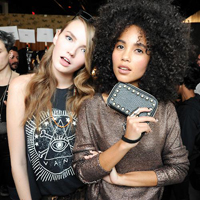
In an exclusive interview posted yesterday, September 12, 2012 by Sportswear International, more details were revealed as to why Europe’s premiere denim and urbanwear trade show Bread & Butter in Berlin has decided to scale back, eliminating more than 100 brand exhibitors, and why.
Editor-in-chief Sabine Kühnl talked to Bread & Butter chief Karl-Heinz Müller about his reasons to cut off former exhibitors for the next winter edition and the new alignment and concept of Bread & Butter.
SI: There has been quite a lot of excitement in our industry every since you showed the red card to a number of exhibitors in September. Some do not understand why it happened just now, with registrations for the January event already coming in…
Karl-Heinz Müller: It wasn’t a spur of the moment thing, because I couldn’t sleep one night and got up in the morning thinking: “Oh, now you have to change something.” For about a year I’ve been mulling the idea over that something has to happen within the Bread & Butter brand portfolio. I have to think about what direction the trade fair will take in the future. I owe that not only to myself and the exhibitors, but also the buyers and retailers and, ultimately, to my long-standing employees.
How many existing customers received a cancellation from you and is it final or is there still room for fine-tuning.
There will be about 100 to 120 brands which will no longer be involved and it affects all areas of our event. Most of them have received a final cancellation, but there are also a handful who have been shown a “yellow card” – these brands can prove to us in the next few months that, based on their brand policy, they are a good fit with B&B. And moving forward, a prospective exhibitor who adheres to the laws of a brand, can also come aboard at a later time.
Can you appreciate that those affected are upset now?
Of course I understand them. It’s like when you want to get into a popular club and the bouncer won’t let you in. Then you think the bouncer and the club really suck. I was anticipating that those affected would complain to me and say: “That Müller guy is a real jerk.” But I am responsible for what style and what image this “club” stands for, what the guests look like, and what bands are playing, so that is why I decide who I want to let in. That means I can’t do right by everyone, but I don’t want to do that either. Whoever hasn’t got enemies, hasn’t got friends. Everybody should make a fresh decision each season, not only the brands, but the trade fairs, too.
This liberal approach is important. …but also alienates a few…
Bread & Butter is not just a trade fair, either, it has turned into a brand itself. Making it all that much more important that I pay attention to what idea and what values are attached to it. The Bread & Butter has a clear core brand value. The one who has the ball is always being challenged. And it’s me who has the ball here and I decide what direction the game is going. I also want to stress that I’m not trying to show anybody up and that’s why I prefer not to name any brands in this interview.
You don’t need to either, because the word’s already out…
Yes, that was researched, which is also alright, but I am not exposing anybody here. Especially because it is about brands which are certainly well represented in retail and selling well. But I am interested in a certain brand culture.
What do you mean by brand culture?
It is about brand building, about a certain level of quality, taste level, the brand environment in which it operates or the distribution policy. It is so much more than just the collection and the value for money. On the one hand there are also brands which have gained an image through years of work and stand for a given style. You connect something specific with them, because they are original and authentic in how they present themselves. This can be applied to specialists, small, and new labels too. And on the other hand there are manufacturers that produce clothing, true, and also market it and it works on the market, but there is no true brand underlying it. They haven’t got genuine recognition value.
But in the past retailers were able to find these collections at your event. Some of those affected were even exhibitors for several years…
…because they had good arguments favoring inclusion at that time – for example, that they were doing well on the market, because they were new, or had a new range to offer. But then over the course of several seasons there was simply not enough happening in terms of brand building. It doesn’t count, either, that somebody was an exhibitor for a longer period – because the converse also doesn’t count, in other words if an exhibitor decides to leave us of their own will.
Let’s go through all the complaints which were made: First of all, it is only about the major, established, or expensive brands, whose tune you dance to.
That is simply untrue. If it had only been about the big brands, then I would have to invite Esprit or S.Oliver to come. If I only included expensive brands, why do Dr. Denim and Cheap Monday come and exhibit? At exhibition halls like L.O.C.K. or Fashion Now there are a large number of small, individual labels or newcomers, too. And, incidentally: It’s the major brands which cause me the most work because they constantly have new, elaborate and unusual ideas and presentation formats. The lesser known ones make my life much easier because their presentations are far quieter. But we actually like going to the trouble of having some big brands on board because they also come up with unique presentations.
Second complaint: Why have the cancellations only happened now with booth locations and hotel and flight reservation plans already underway.
At the moment we are still at a very early stage of the planning and hotel and flight reservations have not been made yet. In addition, one can assume that these brands are also going to be exhibiting at other trade fair platforms in Berlin.
Third complaint: Why was the press informed first, why were the cancellations done impersonally via e-mail? That the press was informed first is not entirely correct. At around 7:30 in the evening on Monday we started to inform the German specialist press, on Tuesday morning the international specialist press and at the same time during Tuesday morning we informed all potential exhibitors about our plans. That we talked with some brands personally afterwards, that I am responding personally to how some felt about the cancellations, providing an explanation and getting in touch with the people myself, goes without saying. But it does not change anything about the facts.


